HP dm1z: Taking Fusion on the Road
by Dustin Sklavos on February 21, 2011 7:00 PM ESTBattery Life
The big news with Brazos, and by extension the HP dm1z, is the substantially improved battery life over Nile. While performance is nowhere near a strict win over that platform (Atom on the other hand...), power efficiency absolutely is. Take a look at this.
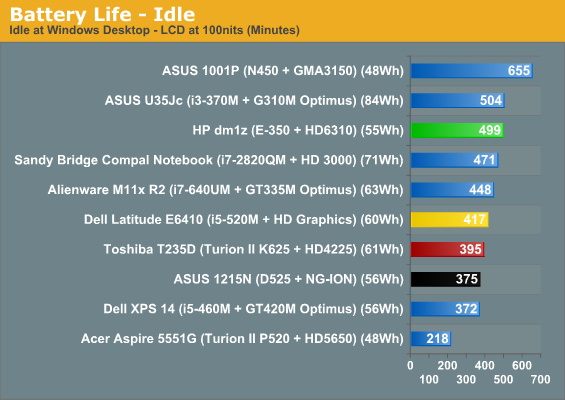

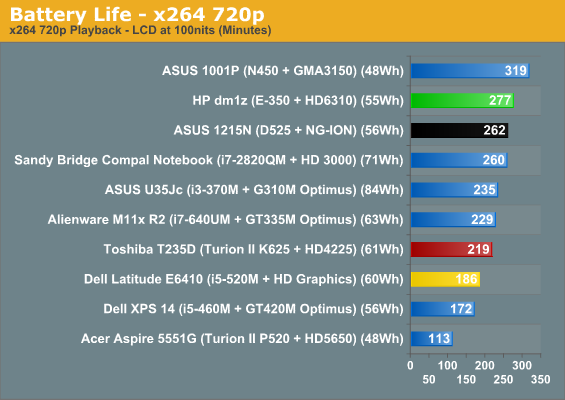
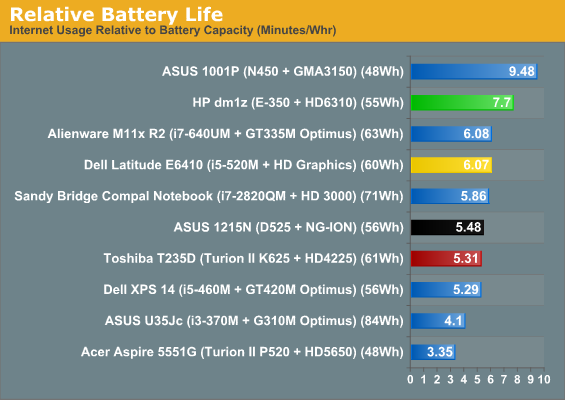
While portable gamers are probably still going to want to hang with Alienware's M11x, Brazos basically tells Intel's dual-core Atom to pound sand. The dm1z doesn't hit the battery life HP advertises (9.5 hours is pretty optimistic, probably only possible with wireless and Bluetooth disabled and the screen at the lowest brightness), but it still pulls more than seven hours of useful running time with a reasonable screen brightness and runs roughshod over Nile.
Heat and Noise
Unfortunately, where things get a little dicey (at least with the HP dm1z) is noise. First, the good news: heat output.
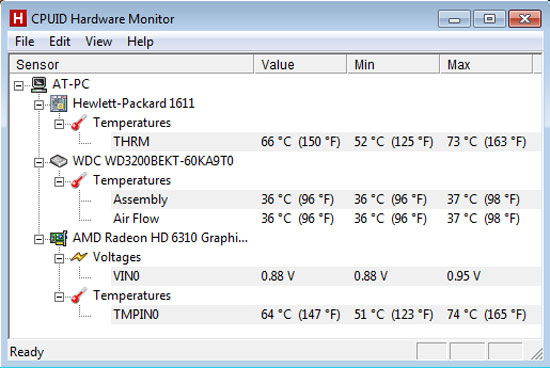
The internal components run at fairly reasonable temperatures, if a little on the high side, but fortunately those temperatures don't translate into an uncomfortable user experience. Quite the opposite in fact: the dm1z can happily be used on your lap without scalding you.
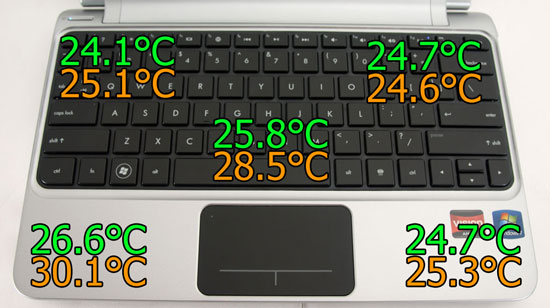
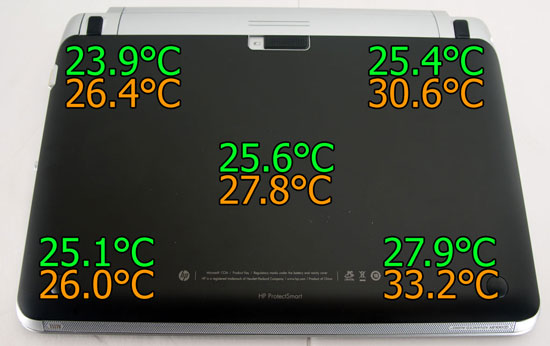
At idle the HP dm1z remains nice and frosty, and under sustained load the outside temperatures don't increase enough to make using the dm1z uncomfortable. But remember what I said about noise?
Part of the reason the dm1z is able to stay so comfortable is because the fan is almost constantly running. It's fairly low and not too obtrusive, but I have an AMD-based 15.6" Sony notebook on hand for review that runs quieter than the dm1z does at both idle and load. That may not be entirely fair because the 15.6" machine has more breathing room in the larger chassis, but it's nonetheless an issue. The fan in the dm1z doesn't spin up that much under heavy load, which would be more appreciated if HP was able to tune it to run just a little quieter at idle. This isn't make-or-break noise, but it's worth bringing up.
Update: Several of our readers pointed out that the HP dm1z has a utility called CoolSense as part of the HP Support Tools. It's supposed to allow some customization fan speeds to allow users to configure their laptop to prefer lower temperatures/higher noise, or lower noise/higher temperatures. As a matter of course we disable most of the manufacturer utilities to allow for optimal battery life results, so the above remarks reflect using the laptop without CoolSense enabled. Unfortunately, the dm1z has already been returned, so we are unable to run updated results. Anecdotally, noise is much better with CoolSense enabled.










108 Comments
View All Comments
Shadowmaster625 - Tuesday, February 22, 2011 - link
There was a 200 post thread on slickdeals that showed how you could get this notebook for around $400. Some people were even getting it under $400. I dont know if you still can though.Wieland - Tuesday, February 22, 2011 - link
It's definitely not available anymore, but I was lucky enough to jump on while it lasted. I got one for $352.99 including taxes and shipping after cashback with no payments due for six months through BillMeLater. I finally have a replacment for my Travelmate 8006lmi.jrs77 - Tuesday, February 22, 2011 - link
Can you load a copy of Ubuntu 10.04 LTS and see if it works?I'd rather not have a bloated OS like Win7 on a netbook.
MrVeedo - Tuesday, February 22, 2011 - link
i thought i read the dm1z was shipping with ddr3 1066 memory? does the platform indeed run at 1333?xavier78 - Tuesday, February 22, 2011 - link
HP lists the webcam as VGA, not 1.3MP. Do they now offer that as an option to upgrade?Quixote One - Tuesday, February 22, 2011 - link
I agree that the new Brazos version of the dm1z is a slick little machine. The deal-breaker for me is the lack of the most current, higher-speed data-transfer interfaces -- an especially egregious omission in a netbook/"notbook"-class machine without an on-board optical drive. Other machines in this class have had either USB 3.0 or eSATA ports (and often both) for a year or more now as pretty standard features.If HP rolls out a follow-up model at around the same price point with at least one or the other (and hopefully, a less dismal screen), I'm there in a heartbeat.
darkhawkff - Tuesday, February 22, 2011 - link
I think you're seriously mistaken on many comments here. I don't see this AMD Brazos platform as being any better than what's been out for a year plus.HP Mini 311 does as well as this netbook does, and it's been out for well over 1.5 years now. How is this a step up?
Just a word of advice, look at the whole netbook scene before making an article. Even the Asus 1215N is similar in performance in most respects. There again, how is this giving people the 'netbook they've been waiting for'? It isn't. It's a side grade from AMD, if you don't like the evil powers of Intel/NVidia.
Plain and simple, stop leaning towards AMD. The only real advantage I see, is the price. It's probably a little bit cheaper than the Intel/NVidia solution, which you barely make mention of.
Overall, I see this article as a "Look what AMD did! You should buy it!", when comparable performing machines have been around for quite a while (my Mini 311 cost $700 1.5 years ago....when this was cutting edge).
Taft12 - Tuesday, February 22, 2011 - link
The last bit you said in brackets is why this is a notable machine. Netbook performance that cost $700 just 18 months ago is now $449 (or ~$400 on some slickdeals post) thanks to integrating all the discrete components that were needed on that platform (CPU/northbridge/southbridge/PCIE bus/graphics chip). Battery life also benefits greatly from this as you would expectApparently the netbook segment isn't as slow-moving as everyone thought!
darkhawkff - Tuesday, February 22, 2011 - link
I think you missed the point. We could do this 18 months ago, and still achieve the same relative performance. Yes, it cost more 18 months ago, but that's how technology works. As time progresses, prices decrease for the same performance. The idea though, was that Fusion would be a big increase in netbook performance. So, where's my increase? It's not there, and thats the point. This article made it seem like this was an increase compared to whats out there. It's not, which is my point. Another thing of note, Ion is based on the 9000 series NVidia chips, so Fusion (ie 5400 series product) is only comparable to a 4 generation old competitor? As I said, the article makes this sound as if it's a new and exciting product. It's new, but it's not exciting, and it doesn't increase performance. The only thing this has going for it, is price. If NVidia could put a chipset out for Ion, this would be irrelevant when it comes to 'netbook performance'. Plain and simple.joe4324 - Tuesday, February 22, 2011 - link
its not cheaper even, ION on a 11.6" screen was $399 16 months ago... This is coming out at the same price I thought?